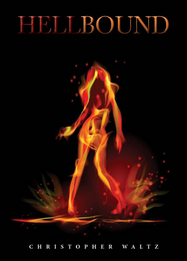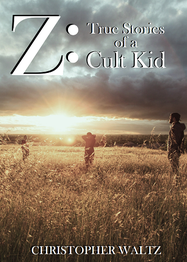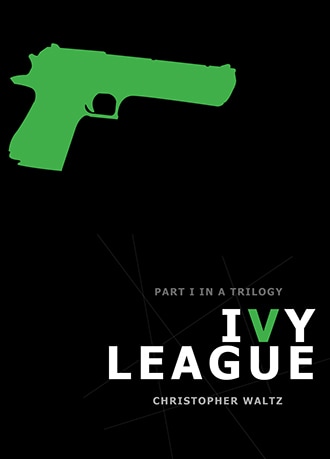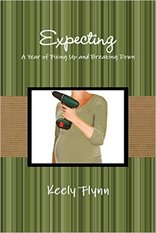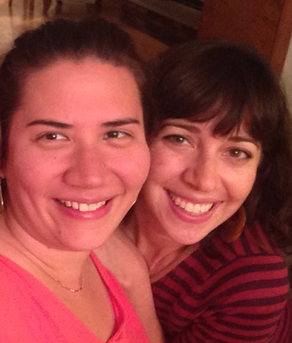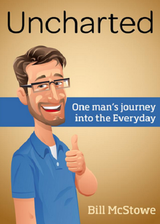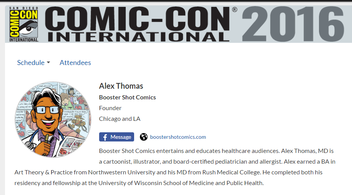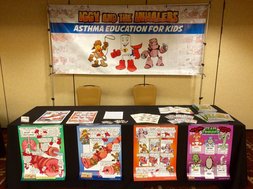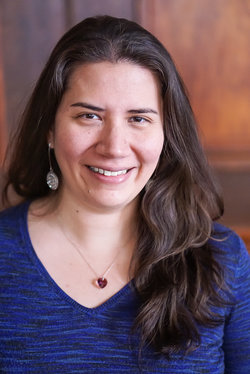|
Welcome to week ten of the #WritersQuick5 series - where we learn about writing from fellow writers. This week I’m very excited to introduce you to Christopher Waltz, an author with a genre that totally fascinates me - horror. I personally believe it takes a lot of creativity to write horror. You have to know just when to ratchet up the suspense and you have to be ruthless with your reader's emotions. Christopher also writes YA - and in a new genre to me - YA horror. As an avid reader of YA novels, that marriage of styles totally intrigues me. Christopher has self-published several novels, has traditionally published several short stories, and is creator and lead writer of the Dead Oaks Podcast, a horror anthology podcast that releases a new episode every two weeks. I met Christopher through the writing platform Channillo.com where he currently has three book series to choose from. Let’s see what Christopher has to say… Question #1 - Where do you write and why do you write there? I wish I could say I'm one of those people who can just sit down and write anywhere, but as of late, I need to be in a public place to get any writing done. I don't know why, but if I'm at home, I get distracted way too easily and can't seem to organize my projects. However, if I'm at a coffee shop, or the library, or the community center, then it's right down to business. If I'm in public and have some coffee, then I'm good to go. Question #2 - What is unique about writing for your particular genre? Since I've been writing mostly YA recently, I'll say that it's very important to understand how people--particularly young people--talk and interact. One of my biggest pet peeves is reading a story or a novel where the dialogue is completely unbelievable. Luckily, I used to teach middle school English and currently still spend a lot of time working in high schools, so it's fairly easy for me to pick up on how teenagers speak to each other. But I also understand how it would be difficult for writers who aren't around teenagers often to get it, for lack of a better term, flat-out wrong. Question #3 - What are some of your grammar or punctuation pet peeves? As I said before, dialogue is a huge pet peeve for me. If you're writing about any group of people, whether it be teenagers, or the elderly, or people from a particular region--do your research and write their dialogue realistically. Other than that, I feel like I can't judge people too harshly on their writing styles (editing is another story...). I tend to write long, drawn out sentences with sort of obscure punctuation, and I'm sure that gets on many people's nerves. Some people hate semicolons and em dashes, but I love them. Question #4 - At what point in your writing process do you start to bring other people in to review your work? It sort of depends on the topic I'm writing. I'm very self-conscious about people reading my writing before I'm completely happy with it, so I usually don't bring editors or beta readers into the mix until pretty late in the game. However, I finished a novel in December, and the main character was captain of his school's swim team. I'm terrified of drowning and don't know a thing about swimming competitively, so I spoke to several different resources about good versus bad times for different swim strokes and what a typical practice looks like. It was extremely helpful to have an expert to turn to every time I needed information. Question #5 - What advice would you give to a new writer about the writing process? I would tell a new writer that the most important parts of the writing process are what happens both before and after you actually write. Writing is the easy part; It's what you love to do. Planning, plotting, editing, revising... those are what will really test you as a writer and show people you have what it takes to make it. I'd also tell them that if they are determined to publish traditionally, not to let a few rejections turn them off from finding the right publisher for their work. I spent so much of my time in the first years of my career being bummed out because I thought no one would ever like my writing based on twenty or thirty rejections. As it turns out, if you stick with it, you might have the pleasure of ending up with hundreds of rejections... and that's not a bad thing. Thank you so much Christopher for these incredible answers. I absolutely love this line: Writing is the easy part; It's what you love to do. Planning, plotting, editing, revising... those are what will really test you as a writer and show people you have what it takes to make it. Gosh, that is just SO TRUE! I truly appreciate you taking the time to share your insights with us. Please check out Christopher’s work on Channillo.com and check out his Dead Oaks Podcast, now available on SoundCloud. Also, be sure to follow him on Twitter. *** If you would like to be featured as a writer in the #WritersQuick5 series, please just reach out and let me know. I’d love to promote your work as well! For updates on #WritersQuick5 and other info from me, please follow me on Twitter or check back with this blog for all the latest.
0 Comments
So yeah… It’s been 24 weeks. 24 weeks since I decided to leave my job and devote myself to the goal of finishing my novel, The Cube. Some of that time was spent waiting for feedback. Some of that time was spent exploring my city Chicago. I spent time with friends and family and got other avenues of writing set up like my #WritersQuick5 interviews and my Amache’s America series. Some of that time was spent doing plain old chores and some of that time (lately) has been spent setting the gears in motion to reenter the traditional workforce (more on that soon). But, the goal… the ultimate goal… was always to finish The Cube… and ladies and gentlemen… I’m pleased to tell you that as of today I’ve reached that goal. Yes, that’s right folks. I have myself a book (insert appropriate ‘hurrah’ bitmoji here). At the beginning of the week I received the last batch of notes from the editor I’m working with. I’ve made my final changes and today I sent the book out for proofreading. Once that last step is complete, and I’m sure that all the commas and periods and quotation marks are in all the right places, I will be up and running to start querying agents. I can’t tell you what a high it is to know that I have accomplished my goal and that the seemingly random mid-week dream I had sketched down on a scrap of notebook paper back in 2011 is now a fully fleshed out, honest to goodness, novel. I now have something that is worlds apart from what I started with, imbued with the original intent and essence of my dream, but through hard work and great collaboration is now so much better. It is a story that I love and that I want to be told… a novel that is both topical and hopefully timeless… something that I am honestly proud of. So, stay tuned. I’m going to spend the next few weeks getting all of my agent queries in line so that when the proofreading is finished I can go ahead and press send on as many query letters as I can muster. Agents be on the lookout. The pitch for The Cube is soon coming your way. As always, thank you all for your support and encouragement. It continues to mean the world to me that so many of you support my dream of becoming a published author. I really, truly, can’t wait for you to read The Cube. To commemorate the occasion, something I have never done before… here’s a passage from the book itself. The FINISHED book. YAY! He found his way down to 57th Street and parked in front of Medici’s. He wished they were just going there. Medici’s had been there forever and he knew he liked the food. But they were going a few doorsteps down to a new place called ‘The Cube’s Annex.’ Max’s choice, Max’s night, he reminded himself. “Stella, pay for parking,” he said as he powered down the car. “Parking paid,” Stella replied. Will climbed out of the car and pressed his palm against the side to lock it. He jogged across the street and stood in front of the restaurant. On the storefront marquee, instead of the word ‘Cube’ there was a holographic three-dimensional rotating cube in between the words ‘The’ and ‘Annex.’ “Subtle,” he whispered under his breath. He allowed himself one eye roll to get it out of his system and then pushed open the door to the restaurant. “Are you here to dine or to play?” the hostess asked. Will looked around. He saw that lining the far wall of the restaurant were standing VR stations for headset play. “I’m here to dine, please. I believe a friend of mine is already here. Yes, I see her right there,” Will said, pointing to the back. Sitting at a four person table was Molly, captivated by whatever she was reading. Her long black hair was slightly covering her face. Will always wondered how women could see when their hair was in their way like that. The hostess motioned for Will to go ahead and Will started his way through the restaurant. Everything around him was white. White walls, white tables, white chairs, white uniforms for the wait staff. Made sense for a Cube restaurant. There was nothing quite as blinding white as the inside of The Cube, right before game play. The normal color of the clothes of the patrons was a bit jarring against all of the white, like a jelly handprint on a wedding dress. On the wall opposite the VR stations was a giant interface, split into multiple views, all showing Cubes from around the country. A small child was touching one of the screens, each touch flipping the view to another live shot – Alaska, Montana, West Virginia. The largest view, in the center of the wall, was locked and was broadcasting the Illinois Cube (although everyone called it the Chicago Cube). The Cube was huge, about three stories tall, hovering at an angle over The Cube Deck base. It was radiant, light bouncing and reflecting off of the thousands of tiny solar panels that made up the surface of all six of its sides. Surrounding The Cube was a large stadium and miles of grounds and open park space, but the interface was zoomed in on The Cube itself, slowly spinning in place. Welcome to week nine of the #WritersQuick5 series - where we learn about writing from fellow writers. Today it is my sincere pleasure to feature writing advice from my dear friend Keely Flynn. I’ve known Keely for many years and she has brought endless joy to my life. As a writer, Keely wears many hats, including serving as the arts columnist for Chicago Parent Magazine (and their sister publications) and writing her amazing blog, Lollygag Blog, that covers life in Chicago with all of Keely’s inherent charm and humor. Lollygag Blog posts range from parenting, to city living, to DIY cautionary tales, with a few product reviews and a NKOTB header thrown in for fun. Keely has also written for the Chicago Tribune, 101.9FM The Mix, and is a member of Netflix’s Stream Team. If that wasn’t enough (have I mentioned she’s amazing?) she also wrote a book, Expecting: A Year of Fixing Up and Breaking Down, about the period of time when she and her husband bought a fixer-upper home after discovering she was pregnant. Keely and her husband are now the proud parents of three children, proving once and for all that she may have actuals superhuman powers. Let’s see what Keely has to say… Question #1 - Where do you write and why do you write there? I have a pretty sweet closet desk set up in my dining room, but I’ve also gotten pretty good at writing on the floor of my kids’ rooms and in the front seat of the Honda Odyssey in the pick-up line. Additionally, Chicago Parent's editorial staff has been incredibly wonderful and permissive in allowing me to explore the arts-heavy nature of this town, not to mention how terrific it all is for kids. They're also really great to their writers; I'll be loyal to them forever! Netflix is a no-brainer (and also a fantastic company to work with). And I've been writing plays and stories since high school. Some people jog to clear their brains; I write fast-paced murder mysteries and sidekick narratives. Question #2 - What is unique about writing for your particular genre? As a columnist for a parenting magazine, I get to imbue whimsy and fun turns of phrase into what's generally a straighter-laced, info-heavy type of reading. In terms of writing plays, it just feels really good to a) be putting more theatre out into the world, b) doing so as a female writer, and c) show my kids that new works are alive and well (if underpaid). Question #3 - What are some of your grammar or punctuation pet peeves? Oh man, the whole "you're and your" shebang really makes me crazy. Also- autocorrect is merely a suggestion. Proofread those texts, people. Question #4 - At what point in your writing process do you start to bring other people in to review your work? For biweekly and monthly columns, by the second draft. (My magazine editors are rapid-fire that way.) And for plays and books, I bring in a select one or two really early on, like the first chapter drafts to see if they get where I'm headed. (My poor husband. There is, quite literally, no correct answer for him. If he questions anything, I'm convinced he's never understood me. If he applauds it, I think he's trying to stave off a fight.) Question #5 - What advice would you give to a new writer about the writing process? Don't self-edit! Ever! Early on, just let it all free flow, especially if the story or characters are coming from every direction.There's plenty of time to refine, shape, and cut. Those early ideas, though, are pure magic (even if you have to say goodbye to a bunch of them). Thank you Keely for taking the time to share these answers with us! I love your advice to let early ideas flow. You’re right, you never know what magic might sprout! Please do find Keely on Twitter, Facebook, Instagram, and read all of her delightfulness at Lollygag Blog. As an added bonus, go out right now and buy her book! One final note, Keely’s advice and insights have never steered me wrong. She is a gem in this world and I’m grateful for her every day. ***
If you would like to be featured as a writer in the #WritersQuick5 series, please just reach out and let me know. I’d love to promote your work as well! For updates on #WritersQuick5 and other info from me, please follow me on Twitter or check back with this blog for all the latest. Welcome to week eight of the #WritersQuick5 series - where we learn about writing from fellow writers. One of the reasons I’m enjoying the writing platform Channillo.com is the connection you can make with fellow writers. I’ve found writers on the platform to be accessible and friendly and it’s been fun to exchange messages and get to know people and their work. One of the most prolific authors on the website is microfiction author Bill McStowe. Bill’s work has been featured in blink-ink and in the Microfiction Monday Magazine Print Anthology’s Best of 2015.
Let’s see what Bill has to say… Question #1 - Where do you write and why do you write there? I don’t have a designated writing space, so I write anywhere I can. I prefer notebooks for my early drafts so flat surfaces are important. My knee in the car, for example, counts as a flat surface. Question #2 - What is unique about writing for your particular genre? My weekly series “Uncharted” appears on Channillo. For about a year and a half now, I’ve been writing a story a week. The stories are written loosely in journal form by a hapless hero. The journal idea gives me freedom, so it’s a bit different. The stories stand alone, but with familiar characters and places. Question #3 - What are some of your grammar or punctuation pet peeves? I’d like to see a global gathering of grammarians hash out a universal rule on the punctuation in/outside the closing quotation mark thingamabob. Obviously, I would not be invited because I use words like “thingamabob.” In Australia, this would appear as “thingamabob”. Question #4 - At what point in your writing process do you start to bring other people in to review your work? These days, I’m not bringing too many people in to review my work. My concentration is the weekly series, so I have a quick turnaround. I spend a lot time reading aloud as a way of being my own critic. That said, I do miss writing groups. I’ve met some wonderful people over the years. Question #5 - What advice would you give to a new writer about the writing process? Avoid words like “thingamabob.” Thank you Bill for your answers. I agree with you on the quotation marks - and for the record, I love the word thingamabob. If you want to keep up with Bill, please check out his series Uncharted on Channillo.com. You can also visit his website and follow him on Twitter. *** If you would like to be featured as a writer in the #WritersQuick5 series, please just reach out and let me know. I’d love to promote your work as well! For updates on #WritersQuick5 and other info from me, please follow me on Twitter or check back with this blog for all the latest. So, small win for this week… or you know what, let’s call it a BIG win… I finished the latest round of edits on my novel The Cube and sent the whole book back to my editor on Monday. Draft FIVE is now complete!!! Some edits were easy-peasy and I just flew right through them. Some of the edits were tricky, but ended up well. Some I’m still not sure about (like I cut the word count of the last few chapters down by about half… eek!). But it feels good to be one step closer to the finish line. If she likes what she sees, then we’re onto proofreading. If that goes all according to plan, then I’m on track for my goal to start querying agents in March. That will be nerve-racking… and surely a blog topic for another day.
What is TRULY SCARY now is that in addition to my book series, Amache’s America on channillo.com, I’m also starting to write my next book. Yes, that’s right. The Cube is coming to an end and there’s no rest for the wicked. Well, truth be told. I’m actually starting on my next TWO books because I have a sequel in mind for The Cube and I’m also itching to get started on writing The Samurai Prophecy. In her book Big Magic, Elizabeth Gilbert talks about how ideas are alive and come to you and can just as easily leave you. She writes, “If inspiration is allowed to unexpectedly enter you, it is also allowed to unexpectedly exit you.” That resonates so true and scares the crap out of me because I’ve had the idea for The Samurai Prophecy for close to a year now and I’m petrified it will leave me. Don’t leave me, I want to write you! But really, why am I doing this to myself? Why not just make sure The Cube gets out there and then start the next book? Well, truth be told, every author I have spoken to has told me the same thing: you have to KEEP WRITING. Why? Well… if… no WHEN (claiming it!)… The Cube is published it could take 1-3 years before its on bookshelves. Plus, writers are more attractive to publishers if they’re not a one trick pony. The scariest bit is that some writers have told me that their first books never get picked up but that their second or third books do. EEEEEEK. I am determined to be an author, so I better get crackin’. And, of course, there’s just the added bonus of writers are born to write. So, write I will. I will admit that I have this fear that if I don’t manically focus on one book at a time, somehow the quality of all the books I’m working on will go down, but I think that is just a fear. I also do feel a bit like a crazy person, holding all of these fictional worlds and people in my head. But I’ve decided that type of crazy is the best crazy possible. I’m actually usually at my best when I have a bunch of different things to bounce in between, so this is a pretty fun time for me. I just hope one day I will look back at these early blog posts with a warm-fuzzy sense of nostalgia - for the time I was writing multiple books for no one but myself - because baby, I was born to do it. Welcome to week seven of the #WritersQuick5 series - where we learn about writing from fellow writers. There are some people with innate gifts - ways of doing things or seeing things that can’t necessarily be taught or learned - that continue to bless the world with their talent. One of these people is my dear friend Alex, who has been sketching, drawing, creating basically since leaving the womb. There are many ways he has taken this to the next level, whether it be through bringing drawing to the stage through Live Action Cartoonists, to The Adventures of Captain Hare Borne and The Space Squadron, to his political satire, to his most ambitious and impressive endeavor - marrying his career as a doctor with his command of words and his love of drawing. Alex and his friend Gary Ashwal started Booster Shot Media, a creative firm that creates health education materials (comics, whiteboard drawing videos, animation) for - and with - the healthcare industry to produce results-focused content. Alex and Gary are perhaps best known for Iggy and the Inhalers, a Pokemon-style education program for kids with asthma. Iggy was the “Best in Show” award winner for the 2016 Health Information Awards and the 2015 winner in the multimedia category of the American Public Health Association’s annual Public Health Materials Contest. Alex and Gary also showcased Iggy as panelists at the 2016 San Diego Comic Con. As you can imagine, his particular brand and style of writing is unique and I’m so honored he’s agreed to share some insights with us. Let’s see what he has to say… Question #1: Where do you write and why do you write there? I usually write (and draw and sketch) in my basement art studio. It's a nice dedicated work space for my art supplies, drawing table, computer and digital drawing tablet. My wife recently got me a mobile drawing tablet so I can work anywhere, but I do like having a place where I can leave work out and just pick up where I left off. Question #2: What is unique about writing for your particular genre? Writing health education comics is very collaborative. Gary and I will write scripts for comics and videos together. We'll then create storyboards that we review with our clients (typically a group of researchers or clinicians). They may have certain technical details they want included or certain requirements needed for what we are creating to be used in a research study, so their feedback is very important. At the same time, we are also mindful that the intended audience still needs to be entertained and we never want to lose sight of the fact that what we create also needs to be fun and both narratively and visually engaging. Question #3: What are some of your grammar or punctuation pet peeves? I really don't have any. I'm sure this entire thing is full of errors. Also this spell check is telling me that "narratively" is not a word. Are we in agreeance that it is a word? Question 4: At what point in your writing process do you start to bring other people in to review your work? As I mentioned before, our work as Booster Shot Media is very iterative. We rely on feedback from the experts as well as the audience to make sure we are communicating (often complex) information effectively. On several projects, we conducted focus groups where we got feedback on storyboards before we created the video or comics. The focus group members never have any idea that the people conducting the focus group actually created the storyboards they are picking apart. The feedback can be pretty brutal at times- it teaches you to grow a pretty thick skin and not lose sight of the communication goals of the project. I recall one woman from a focus group looking at my sketches and saying to me (not realizing that I was the artist), "These drawings need a lot of work. Let's just say this guy ain't Walt Disney." Ouch. But, you learn to get over it. YOU HEAR THAT, CARLA?? I GOT OVER IT!! I KNOW I'M NOT WALT DISNEY, OKAY??! Question #5: What advice would you give to a new writer about the writing process? I think I have had my most creative and successful work when I didn't excessively plan or outline things out in the initial stages. So don't be to precious about your ideas, and just put ink to the page and write (or draw) and make something! Thank you Alex for these incredible answers. I love "don't be to precious about your ideas, and just put ink to the page and write (or draw) and make something!" Such great advice. Plus, I’m just glad you finally got to put Carla in her place. Please visit the Booster Shot Media website and follow Booster Shot on Twitter. Also check out the Iggy and the Inhalers website and don’t forget to check out their store where you can order Iggy Products. PS… A few weeks ago I featured filmmaker J.C. Reifenberg in a #WritersQuick5 and mentioned that he was in my prom group. Well, to up the ante - Alex WAS MY PROM DATE. BOOM! Represent 1999 GBN Prom, represent! *** If you would like to be featured as a writer in the #WritersQuick5 series, please just reach out and let me know. I’d love to promote your work as well! For updates on #WritersQuick5 and other info from me, please follow me on Twitter or check back with this blog for all the latest. One of the hardest parts about writing a debut novel is that there are certain parts that you PAY to do. I mean, maybe not everyone does, but I’ve certainly found that it comes with expenses. Whether it be membership to a writing community to network or paying to attend an event, a webinar fee to learn more about the industry or a certain expertise, assistance from a graphic designer, or a website URL and platform (which coming from web production I just could not bring myself to use a free, aka highly limited, domain or website)… money is going out the door, but nothing is coming in. All of these things could be skipped, I suppose, and I certainly set limitations, but I’d be shocked to find a writer that doesn’t pay for SOME part of being a writer.
My biggest expense is my editor. I pay her an hourly fee every month. We have a max number of hours per month set up based on my self-budgeting, so there is a cap. But, since I have started writing, I haven’t gone a month without using her. And I have to say, it’s been worth every penny. So what do I mean by 'editor'? Basically someone that focuses on content and ideas, rather than on copy-editing/proofreading. It’s someone that will help you form the structure of your book and will point out where the story needs to be built out or scaled back. They may present ideas of their own, but they do not write any part of it. They comment and provide feedback along the way to your final manuscript. I started using Laura in late 2015 when I was really beginning to take my novel seriously. If I hadn’t, I think I’d still be under the (delusional) opinion that the first draft of my book was pretty good. In the nicest way possible, she showed me its flaws and walked me through what I needed to do next. She provided me resources to learn more about plot construction and encouraged me to use an outline (which, unbelievably, I hadn’t done the first time around). She coached me on which characters needed to be flushed out and where my dialogue was particularly weak. Her initial feedback showed me I needed to kind of start from scratch, even if the idea of starting from scratch was absolutely overwhelming. So overwhelming in fact, I stepped back from the book and didn’t re-engage with it until the summer of 2016. I knew right away I needed to loop Laura in again. Throughout the fall Laura and I regularly went back and forth with feedback on my outlines (we went through five drafts) and feedback on my book. We are currently tackling draft five of my book. I’ve been processing her recent round of comments all week. So, why is this so useful? I need an objective voice - my husband and friends will always tell me what I’m working on is great. They may give me a point or two, but they are too emotionally involved with me to lay it all out. Laura calls it all out. She tells me what is working and what isn’t. She tells me when a section I think is cool is too long and needs to be cut or when a character I think is clear is completely confusing. She isn’t worried about a personal relationship when she critiques me, so that frees up our back and forth. PS… there is no better feeling than when I get a note that just says “this is good!” or “I love this!” because I know that it must be pretty good for it to get a note. I need a trained opinion - although I was a double lit major in college, wrote paper after paper in grad school, and have written extensively and in a wide variety of formats for my various jobs, I have no training specifically for writing, especially writing a novel (man do I wish I could go back in time and take at least one creative writing class in college!). There is a skill to this, a structure, a proper procedure, that I may implicitly know from reading, but that I do not have any expertise in. There is a method to this, a training, a procedure to writing that I need to learn. Laura points these things out to me as we go along. It’s a great, consistent benchmark - working with the same person for so long allows me to really denote my progress. Whole sections of my book now are comment free. I can tell when one section is a lost cause because it always gets poor notes or when I’ve made marked improvement. And, I have someone who has been with me along the way know the how’s and why’s of my book’s structure. I need a professional commitment - God bless my friends that say they want to read my book and provide feedback, but let’s face it - life gets in the way. A promise to a friend is always made with good intentions, but it comes with a varying degree of follow-through. By having someone ‘on the payroll’ I know that I will get a level of professionalism and follow-through that will guarantee results. Writing is not a solitary activity - I am 100% positive my book is better because of having a second set of eyes on it. Writing is such a personal experience and I realize that so much more is in my head than what is on the paper. When I write something out, it is often imbued with backstory and context that I haven’t actually written. I have found that I NEED to have a reader take a look and give me the READER’S perspective, because ultimately, that’s what this is all about. One of the questions I ask in my #WritersQuick5 series is “At what point in your writing process do you start to bring other people in to review your work?” and I have to say, for me, it’s gotta be every step of the way. I couldn’t do this without Laura. My book wouldn’t be what it is without her, and I know we’ll keep working together on my next book and the one after that. It may seem crazy to spend money to write a book. But, it’s a must in my world and a meaningful partnership. I can only hope that all other writers out there can find a similar relationship, because it’s absolutely worth it. PS… a lot of time people ask me how I found Laura. I wish I had some magic answer for you. She was connected to me by one of my best friends. I’d met her before, so there was a high level of comfort there, and I knew her credentials and felt lucky she agreed to help me. I wish I had some insights into editor searching and/or vetting, but I don’t. In fact, I probably could have been more strategic and paid someone with connections into the industry or to an agency. But, I went with trust first and I’m glad that I did. To learn more about Laura, check out my collaborators page. ** If you would like to be featured in my #WritersQuick5 series, please reach out and let me know. I’m always looking for new people to promote! |
AboutWriter. Archives
June 2020
Categories |
